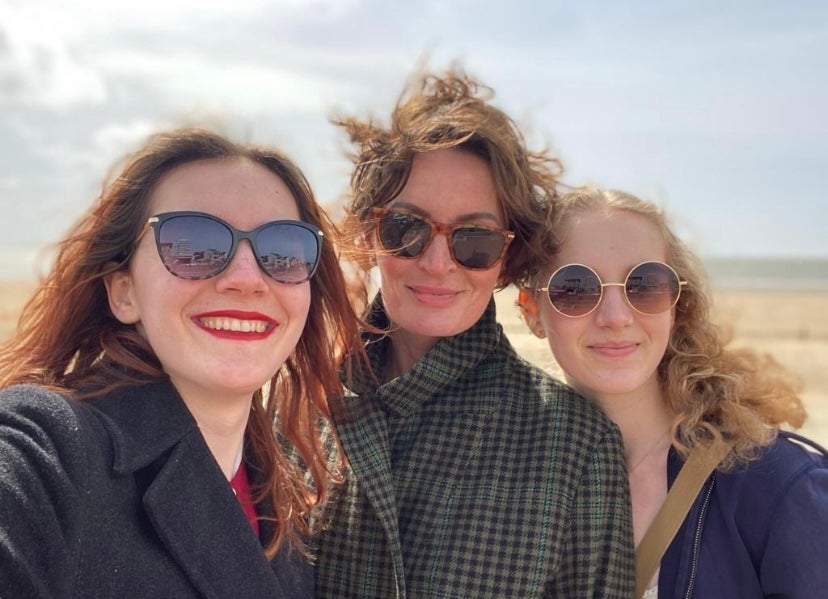The Independent's journalism is supported by our readers. When you purchase through links on our site, we may earn commission.
Girl energy powers the world – we need it now more than ever
Our grandmothers’ time was a man’s world, but is it really better for our daughters, asks writer and campaigner Sophie Walker? On International Day of the Girl, she looks at how far we have we come and how far we still need to go

When my grandmother gave birth, and was told she’d had a girl, she said: “Poor thing.” When I had two girls, I greeted their little lives like hopeful presents. I knew from my experience and that of the women in my family that my daughters faced challenges. I also knew that girl energy drives a better world.
The world was very different – in some ways – when my grandmother had my mum. Men were in charge of households, mortgages and bank accounts. Divorce was rare and scandalous. Abortion was illegal. Schools prepared girls for a life of sewing, cooking and ironing. Few girls went to university, and married women in middle-class households were expected to stay at home. Medical and law schools discouraged young women; so did parliament, the seat of all decision-making, where a total of 38 women were elected as MPs before 1945. Domestic violence was not talked about, much less campaigned against. When Nana worried about the life my mother would have, she had grounds for concern.
My nana forgot her worries when she watched musicals, and my mum inherited her love for them. As a little girl, Mum adored Annie Get Your Gun, and in particular, the number sung by Betty Hutton to a patronising Howard Keel: “Anything you can do, I can do better.” It was a mantra she followed her whole life – becoming the first woman in her family to go to university (she did two degrees, one in French and one in Russian, and is the only person I know who has read War and Peace in the original text).
She campaigned as part of the Women’s Liberation Movement for equal pay, childcare and abortion rights. When she read fairy stories to me, she would always change the ending so that Cinderella said no to the Prince, because she had to go to university first. My sisters and I were told not to marry until we had travelled the world and earned enough to be independent. We would roll our eyes, but we listened.

My mum and her generation did so much to pave a better future for girls. On their watch women won laws that enshrined equal pay, made sex discrimination illegal, outlawed rape in marriage, enabled women to apply for bank loans in their own names. They and their sisters supported each other into tertiary education, into “men’s jobs”, into businesses and institutions – and often helped each other stay there when it was hard.
But progress is not linear. And having laws does not mean they are heeded, or that those who break them face repercussions. In 2023 our justice system is systemically incapable of prosecuting rapists and our police forces are stained deeply by misogyny and sexist attitudes. Women still earn less than men at work, and childcare is unaffordable and inaccessible for many. And young women are feeling daunted. Last month, a poll by Girlguiding found the happiness of girls and young women at its lowest level since 2009. Nine out of 10 girls and young women say they are worried and anxious, their life aspirations shrinking along with hopes that anything will change. Our female MPs include dogged and brilliant feminist campaigners, but overall women still represent only a third of Parliament.
Worse: all of this is happening against a rising tide of complaints from some men that women have it better than them, and are taking away men’s chances of happiness and success. That men’s mental health is much worse than that of women, despite data that shows men and women are suffering equally, in different ways. That boys are suffering because girls do well in school, ignoring the scourge of sexual harassment ruining girls’ educations, and the subsequent sexism that still keeps them out of jobs in science (as one example.)

Abuse and harassment is rife online, where toxic social media influencers tell unconfident young men a way to secure their own futures is to bully and intimidate women. A recent discussion about a proposed minister for men culminated in GB news presenter Laurence Fox commenting on whether a female political journalist was sufficiently sexually appealing. He was sacked, and the conversation became about broadcasting standards, instead of why men are so very angry with women.
Given all of that, the idea that one day can make a difference seems hopelessly optimistic in this atmosphere – but hope is the ultimate act of defiance, and headway comes one day at a time. This International Day of the Girl (Oct 11) is a day to remind us how important it is to celebrate and to look after our girls.
It’s also a good day also to remember the importance of role models who showgirls don’t have to put up with being patronised, pigeon-holed or disempowered. When I was a girl, I loved women in cinema who stood up to men: I sat up during Star Wars when Carrie Fisher as Princess Leia strode in and served; my favourite part of the Indiana Jones movies was the fighting, drinking Marion Ravenwood and throughout the Superman franchise Margot Kidder’s Lois Lane made me want to be the reporter, not the superhero.

Of my two sisters, one loved Madonna, because: “She always looked like she didn’t give a s*** what anyone thought of her.” The other loved all the Spice Girls and all the wives of Henry VIII, explaining: “Girls don’t have to be just one thing.”
These days my girls also admire women who defy criticism and challenge negative voices. My youngest loves Katherine Johnson, whose mathematical calculations enabled Nasa to land a man on the moon and Taylor Swift, the music nerd who made billions from doing her favourite thing – and always seems to know how girls are feeling. My older daughter, who is neurodiverse, loves that the fight for the future of the planet was led by a plain-talking, impatient autistic teenager called Greta who turned top bully Donald Trump’s mockery back to him.
To me now the biggest role models of all are girls themselves. My daughters and nieces and their friends, the young women I see and hear, are kind and funny and tolerant. They understand the layers and intersections of women’s lives constituted by race, sexuality, disability and more. They are keenly aware of the girls we don’t hear from, those living in poverty, forced out of school and into marriage, hurt by war and forgotten when leaders negotiate. My mum made the world better for me. I’ve tried to make the world better for my girls. And when I look at them I see that they’re already making it better with their hopes for the future. Let’s cheer them - and all of our girls - on today.






Join our commenting forum
Join thought-provoking conversations, follow other Independent readers and see their replies
Comments